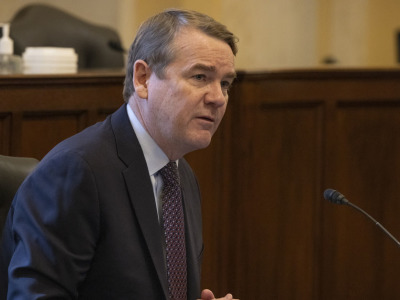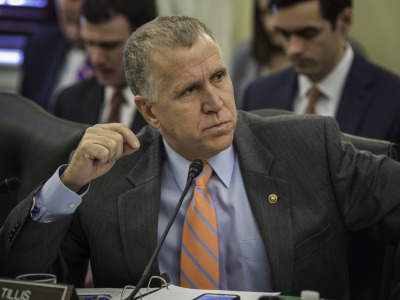Two senators are racing to find a deal on immigration reform for the agriculture workforce, but enacting a farm labor bill remains a long shot in this Congress.
Sens. Michael Crapo, R-Idaho, and Michael Bennet, D-Colo., are trying to work out a compromise version of the House-passed Farm Workforce Modernization Act – a measure that would allow a limited number of H-2A visa holders to work on farms year-round. The visas are now restricted to temporary workers, limiting the value of the program to dairy farms and other livestock operations. Expanding H-2A remains a top priority for the ag industry, where producers have been plagued by persistent worker shortages.
But immigration reform remains as difficult to pass as ever. The American Farm Bureau Federation opposed the Farm Workforce Modernization Act in the House, and passing immigration legislation typically requires attaching a variety of other priorities. The last time the Senate passed a comprehensive immigration bill was in 2013, when Democrats controlled the chamber, and that bill ultimately died in the GOP-held House.
During this Congress, many Republicans have vowed to oppose any immigration legislation until they believe the Biden administration has control of the southern border.
 Sen. Michael Bennet, D-Colo.
Sen. Michael Bennet, D-Colo.It is also an election year, and control of the Senate is at stake in November. Taking a stand on immigration could complicate campaigns where it is a hotly debated issue.
But Bennet and Crapo's offices confirmed to Agri-Pulse that they are trying to work out a deal.
“Senator Crapo and I continue to work toward introducing a bill that would make reforms to the H-2A program to bring much-needed certainty to our agricultural industry and support the farmworkers that uphold it,” Bennet said in a statement to Agri-Pulse.
Iowa Sen. Chuck Grassley, the ranking Republican on the Judiciary Committee, said he could support immigration legislation for farmworkers, but acknowledged it would be difficult to pass.
A non-controversial immigration bill "invites every other complicated and controversial amendment to it, and you never get around to just voting on a simple bill that has consensus," he said.
Grassley said he was unaware of any negotiations involving Bennet and Crapo.
“I would be glad to help that process along,” Grassley said. “I would like to help agriculture get the laborers that they need and year-round labor, not just seasonal labor.”
A spokesman for the Agriculture Committee's ranking member, Sen. John Boozman, R-Ark., said border security would be paramount for him in any immigration dialogue.
“Sen. Boozman has not been part of these negotiations, but more importantly, has stated firmly that he cannot support immigration reform proposals until our borders are secure,” Boozman’s spokesman said. “He understands these programs help producers fill a void, but the humanitarian and security crisis at our southern border have spiraled out of control due [to] the Biden administration’s inaction and that must be addressed first.”
Importantly, North Carolina GOP Sen. Thom Tillis is no longer working with Crapo or Bennett on the issue. Tillis is a member of the Judiciary Committee and a key Republican point person on the issue.
Tillis spokesman Adam Webb told Agri-Pulse that Democrats “walked away from the negotiating table” but the senator is still open to negotiating.
Looking for the best, most comprehensive and balanced news source in agriculture? Our Agri-Pulse editors don't miss a beat! Sign up for a free month-long subscription.
Potentially contributing to Tillis' exit is a bill he introduced in November, the “Keep Food Affordable and Local Act,” that would temporarily freeze the H-2A program's Adverse Effect Wage Rate, a minimum wage for migrants working under H-2A. Tillis’ bill was endorsed by AFBF, but freezing H-2A wages would likely be a non-starter for farmworker advocates and Democrats.
 Sen. Thom Tillis, R-N.C.But Webb said the negotiations "fell apart before Senator Tillis introduced his bill."
Sen. Thom Tillis, R-N.C.But Webb said the negotiations "fell apart before Senator Tillis introduced his bill."
“[Negotiations] fell apart when Democrats walked away from the negotiating table to pursue the go-it-alone strategy of amnesty through reconciliation,” Webb said. “Senator Tillis never walked away from those discussions and has continued to support providing our farmers with a more predictable and workable H-2A visa program. He welcomes the opportunity to continue working on a bipartisan consensus bill that can pass the Senate.”
Bennet's office did not provide a response to Webb's comment.
Allison Crittenden, a director for congressional relations at AFBF, said the organization continues to seek significant changes in the House-passed FWMA.
Crittenden said the first concern is the methodology for calculating the wage rates. Wages have “already increased at a really drastic rate," she said.
She said AFBF also takes issue with placing caps on the number of workers eligible for year-round status and the inclusion of H-2A workers under the Migrant and Seasonal Agricultural Worker Protection Act, which she said would leave farms open to frivolous lawsuits.
Crittenden said AFBF also is concerned with a provision that would require farmers to use the government's E-Verify system to check the eligibility of people to work in the United States.
For more news, go to www.Agri-Pulse.com.


